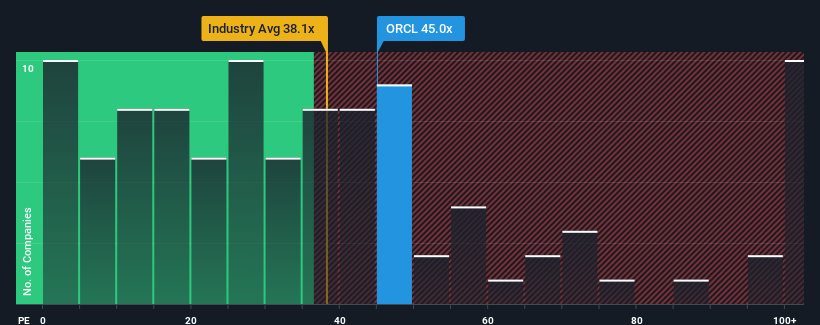- United States
- /
- Software
- /
- NYSE:ORCL
Market Participants Recognise Oracle Corporation's (NYSE:ORCL) Earnings Pushing Shares 27% Higher

Oracle Corporation (NYSE:ORCL) shareholders have had their patience rewarded with a 27% share price jump in the last month. Looking back a bit further, it's encouraging to see the stock is up 63% in the last year.
Following the firm bounce in price, Oracle may be sending very bearish signals at the moment with a price-to-earnings (or "P/E") ratio of 45x, since almost half of all companies in the United States have P/E ratios under 18x and even P/E's lower than 10x are not unusual. Although, it's not wise to just take the P/E at face value as there may be an explanation why it's so lofty.
Oracle certainly has been doing a good job lately as its earnings growth has been positive while most other companies have been seeing their earnings go backwards. The P/E is probably high because investors think the company will continue to navigate the broader market headwinds better than most. If not, then existing shareholders might be a little nervous about the viability of the share price.
View our latest analysis for Oracle

Is There Enough Growth For Oracle?
The only time you'd be truly comfortable seeing a P/E as steep as Oracle's is when the company's growth is on track to outshine the market decidedly.
Retrospectively, the last year delivered an exceptional 15% gain to the company's bottom line. However, this wasn't enough as the latest three year period has seen a very unpleasant 18% drop in EPS in aggregate. So unfortunately, we have to acknowledge that the company has not done a great job of growing earnings over that time.
Shifting to the future, estimates from the analysts covering the company suggest earnings should grow by 19% each year over the next three years. Meanwhile, the rest of the market is forecast to only expand by 10% per annum, which is noticeably less attractive.
In light of this, it's understandable that Oracle's P/E sits above the majority of other companies. It seems most investors are expecting this strong future growth and are willing to pay more for the stock.
The Bottom Line On Oracle's P/E
Oracle's P/E is flying high just like its stock has during the last month. It's argued the price-to-earnings ratio is an inferior measure of value within certain industries, but it can be a powerful business sentiment indicator.
We've established that Oracle maintains its high P/E on the strength of its forecast growth being higher than the wider market, as expected. At this stage investors feel the potential for a deterioration in earnings isn't great enough to justify a lower P/E ratio. It's hard to see the share price falling strongly in the near future under these circumstances.
Before you settle on your opinion, we've discovered 1 warning sign for Oracle that you should be aware of.
If these risks are making you reconsider your opinion on Oracle, explore our interactive list of high quality stocks to get an idea of what else is out there.
New: AI Stock Screener & Alerts
Our new AI Stock Screener scans the market every day to uncover opportunities.
• Dividend Powerhouses (3%+ Yield)
• Undervalued Small Caps with Insider Buying
• High growth Tech and AI Companies
Or build your own from over 50 metrics.
Have feedback on this article? Concerned about the content? Get in touch with us directly. Alternatively, email editorial-team (at) simplywallst.com.
This article by Simply Wall St is general in nature. We provide commentary based on historical data and analyst forecasts only using an unbiased methodology and our articles are not intended to be financial advice. It does not constitute a recommendation to buy or sell any stock, and does not take account of your objectives, or your financial situation. We aim to bring you long-term focused analysis driven by fundamental data. Note that our analysis may not factor in the latest price-sensitive company announcements or qualitative material. Simply Wall St has no position in any stocks mentioned.
About NYSE:ORCL
Oracle
Offers products and services that address enterprise information technology environments worldwide.
Good value with reasonable growth potential and pays a dividend.


